New Testament StudiesThis category of studies includes all New Testament book studies. Note: All Completed Studies are sorted alphabetically by series and then in chronological order within the series. |
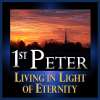
This epistle focuses on the critical doctrine of how we face adversity and how we are to think about it in our lives. The key word is the word for suffering and its many synonyms. The purpose is to remind all believers that God has a destiny and a future inheritance for them. What we think of as speed bumps interfering with our personal plans are actually God’s training tools and are to be expected, rejoiced in, and not dreaded.
Video DVDs of these lessons can be ordered here and here.
To view all video Bible studies of the 1 Peter series, click here (Vimeo) or here (YouTube).
| To listen to this series as a podcast, copy and paste the following URL into your podcast software. www.deanbibleministries.org/podcasts/20151stpeter.xml |
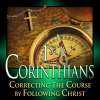
As Dr. Dean points out in the introduction to this 117-lesson study, 1st Corinthians is an epistle written to address problems in one of the worst congregations ever, the church at Corinth. Virtually every problem that a local church can have was present in Corinth.
This epistle is a fantastic illustration of how the culture around us can dominate our thinking if we don't renovate our thinking with the word of God. It also illustrates that Christians operating on human viewpoint can actually be worse than unbelievers. Dr. Dean taught this series while Pastor of the Preston City Bible Church in Preston, Connecticut starting in January of 2002 and concluding in September of 2004.
| To listen to this series as a podcast, copy and paste the following URL into your podcast software. www.deanbibleministries.org/podcasts/20021corinthians.xml |

1 John 5:13 is not the only purpose statement in the epistle: "These things I have written to you who believe in the name of the Son of God, so that you may know that you have eternal life." There is another purpose statement found in 1 John 1:4 "These things we write, so that our joy may be made complete." Then there is another in 1 John 2:1, "My little children, I am writing these things to you so that you may not sin."
| To listen to this series as a podcast, copy and paste the following URL into your podcast software. www.deanbibleministries.org/podcasts/2000_1stJohn.xml |
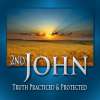
Much about 2nd John is shrouded in mystery. In most epistles we know to whom they were addressed, we know precisely who wrote them and we are reasonably certain when they were written. In 2nd John, the author identifies himself only as the elder. The recipients are not identified by location or name. For centuries they have debated whether this epistle addresses a literal individual lady or a metaphor for a local church. It is amazing that such a tiny epistle is so much debated. As you will see there is a tremendous amount of significant information in this epistle and it reiterates and reinforces many of the same ideas, themes and doctrines we see in the Gospel of John and the epistle of 1st John.
Dr. Dean taught this 17-lesson series starting in 2002 while pastor of the Preston City Bible Church in Preston, Connecticut.
| To listen to this series as a podcast, copy and paste the following URL into your podcast software. www.deanbibleministries.org/podcasts/20022ndjohn.xml |
The shortest book in the Bible (in the Greek), reiterating and reinforcing many of the same Doctrines we see in the Gospel of John, as well as in the epistles of 1st and 2nd John. An entirely new dimension to these Doctrines is presented.
Dr. Dean taught this series in 2003 while pastor of Preston City Bible Church in Preston, Connecticut.
| To listen to this series as a podcast, copy and paste the following URL into your podcast software. www.deanbibleministries.org/podcasts/20033rdjohn.xml |
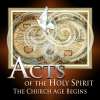
This study covers the book of Acts. The title, "Acts of the Apostles," distorts the thrust of the book. Only two apostles are the focus of the book, Peter, then Paul. John is mentioned as is James, but the others are not. The more appropriate name should be "Acts of the Holy Spirit". Because the Holy Spirit is the one performing the Acts, by empowering the early church, specifically, through Peter, then Paul, to take the message of the risen Messiah from the Upper Room in Acts 1, to Paul's private house prison room, in Acts 28.
To the uttermost parts of the earth ...
Video DVDs of these lessons can be ordered here and here.
To view all video Bible studies in the Acts series, click here (Vimeo) or here (YouTube).
| To listen to this series as a podcast, copy and paste the following URL into your podcast software. www.deanbibleministries.org/podcasts/2013acts.xml |
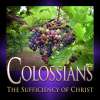
The epistle to the Colossians is a book that focuses on the sufficiency of Jesus Christ and the significance of that for our spiritual life: for the way we think and the way we live.
The author of this epistle is the apostle Paul.
There was heresy going on in Colossee, which was a blend of different ideas. We run into the same kind of thing today. There is all manner of blends of religions today. People think they can pick a little bit of this and a little bit of that, mix it together and add a sprinkling of something else and come up with something they think works for them, and make some new religion. Religion isn’t something that you can believe in because it just “works for you,” it has to be something that has objective reality and objective truth, and is internally coherent and consistent. Yet most of what most people believe is nothing more than a bunch of irrational bilge that somehow makes them feel good rather than deal with what the Word of God says about their basic condition as a sinner. People don’t like to recognize they are a sinner and in disobedience to God because in arrogance they are rejecting the truth.
So with this Colossian heresy, we see the focus is on the sufficiency of Christ. It is that which helps us to realize that no matter what the issues are that we face today, the solution is still the same. It is still the sufficiency of Christ. There are three areas of sufficiency that are always attacked by false teaching and by Satan: the sufficiency of Christ, the sufficiency of grace, and the sufficiency of God’s Word. If God’s Word, God’s grace, and Jesus Christ aren’t enough, then where are we going to get help? We going to go to psychology, to science, sociology, or to some other area of human thought and thus we are going to dilute and diminish the power of God, and we end up destroying grace, destroying Scripture, and destroying the reality of who Jesus Christ is. This is the reason Paul is writing.
Video DVDs of these lessons can be ordered here and here.
To view all video Bible studies in the Colossians series, click here (Vimeo) or here (YouTube).
| To listen to this series as a podcast, copy and paste the following URL into your podcast software. www.deanbibleministries.org/podcasts/2011colossians.xml |

Galatians is one of the most important and vital books in the New Testament. It deals with several vital things that are crucial to understand today such as what is the true nature of the gospel? What does a person do or believe in order to be saved? Today we live in a time where there is much confusion about the gospel, much of which comes under the general title of Lordship salvation. Basically what this means is that if you are truly going to be saved then you have to believe that Jesus Christ is Lord of your life. If He is not Lord of everything in your life He is not Lord at all. Lordship salvation takes faith to mean commitment; it says that the assurance of our salvation is grounded in the evidence of our salvation. So if we look at a person’s life to examine, making every believer a fruit inspector, then if there is no evidence of salvation there is no salvation. They also make a distinction between the kind of faith that saves and every day faith. They take faith to mean commitment. So we are going to be addressing these issues: what is salvation, what is justification?
| To listen to this series as a podcast, copy and paste the following URL into your podcast software. www.deanbibleministries.org/podcasts/1998galatians.xml |

Hebrews is a book that will thrill us. It’s a book that will challenge us in many ways because of its intricate logic. To understand the thought flow of the author, we have to understand the context, not only of Hebrews, but we have to understand the context of the Old Testament citations. Hebrews is not really an epistle. We don’t know who wrote it. We don’t know to whom he wrote. We don’t know the reason or the occasion for this writing. We don’t know where he was when he wrote Hebrews. Nor do we know where the recipients were when he wrote to them. To answer these questions we are forced to dig into the text, to analyze the authors thought flow. To study and understand Old Testament ritual, the Levitical Offerings, the Levitical Priesthood, the operations of the Tabernacle and their doctrinal importance. The writer builds intricate arguments to support the doctrines of the Deity and Humanity of Christ. Which in turn lead to the doctrines of His High Priesthood, His unique Melchizedekian Priesthood. The final chapters focus so heavily on Jesus Christ, to keep the author of our faith before our eyes.
Video DVDs of these lessons can be ordered here or here.
To view all video Bible studies in the Hebrews series, click here (Vimeo) or here (YouTube).
| To listen to this series as a podcast, copy and paste the following URL into your podcast software. www.deanbibleministries.org/podcasts/2005hebrews.xml |
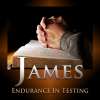
James is one of the most profound little epistles in all of the New Testament, and the writer is writing it specifically to challenge the believers he is writing to to keep pressing on to spiritual maturity. No matter how difficult is it, we have to keep pushing on.
We have two options in life. Job says that man was born to trouble as the sparks fly upwards. We know that we can’t avoid difficulty, hardship and trouble in life, and to think that we can is to live in a dream world. So we have two options. We can either live in the midst of that adversity and convert that adversity to stress in our souls, where we are living in carnality unstable in all our ways, or we can learn how to use what God has given us in grace so that we can grow to spiritual maturity and avoid the instability that comes from converting adversity into stress.
| To listen to this series as a podcast, copy and paste the following URL into your podcast software. www.deanbibleministries.org/podcasts/1998James.xml |